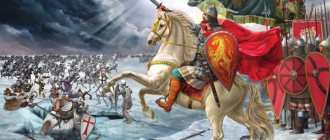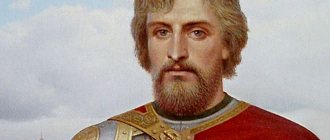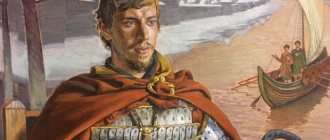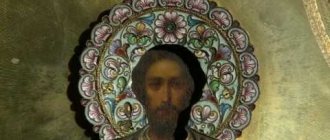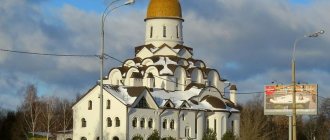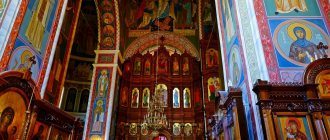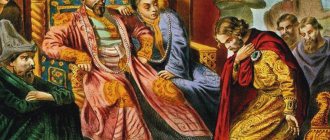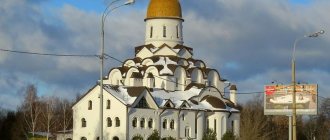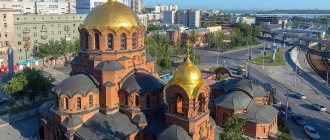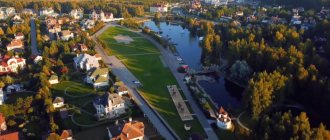Protector of the people
Alexander, which in Greek means “protector of people.” - this name is ancient and glorious. For example, many people know the story of the great commander and conqueror of antiquity, Alexander the Great. A number of cities are named in his memory, the most famous of which is Alexandria, a large city and port in Egypt.
However, in Christianity people are revered not for such feats and not for their desire to glorify and perpetuate their name on earth, calling certain places by this name and creating luxurious tombs for themselves. The king and psalmist David disdainfully says about such people:
“And destroy their dwellings forever, their villages from generation to generation, calling their names upon the lands” (Ps. 48: 12).
No, in Christianity saints are revered for those deeds of virtue that they performed in the name of Christ.
Brief biography
Alexander Nevsky is the son of the Pereyaslavl prince Yaroslav Vsevolodovich and princess Feodosia Igorevna, who was originally from Ryazan. The future ruler of Rus' was born in the last month of spring 1220, in Pereyaslavl-Zalessky.
Reign and military exploits
When Alexander was only 8 years old, his father sent him and his older brother to Novgorod. Here the boy gained the experience necessary for the future prince, and from the age of 16 he participated in battles with the invaders of his native lands. The period of his reign was distinguished by justice and wisdom, for which the prince received the deep love and respect of the Russian people.
Alexander began to be called Nevsky in honor of the heroic battle that took place in July 1240. During this historical battle, the prince and his troops completely defeated the Swedes on the Neva River.
Alexander Nevsky also performed other feats, thanks to which he went down in history. With his participation, the victory on Lake Peipus took place (the Battle of the Ice with the Livonian Order), the Lithuanians who attacked the Russian cities of Torzhok and Bezhetsk were defeated, and the lands of Novgorod and Pskov were liberated from the Germans.
Contribution to the development of Christianity in Rus'
Alexander Nevsky made significant efforts to strengthen Orthodoxy on Russian soil. He is known as a ruler who was interested in the works of theologians and strived for his own spiritual growth and the development of his people.
The prince sought to prevent the transition to the Catholic faith and fought in every possible way for the prosperity of Orthodox Christianity. During his reign, many churches and monasteries were built, many churches and monasteries received large land plots and rich gifts. Alexander Nevsky also spread Orthodoxy in the northern part of Rus', whose inhabitants did not immediately accept Christianity and remained pagans for some time.
Departure from life, canonization and the fate of princely relics
Shortly before his death, Alexander Nevsky fell ill and took monastic vows under the name Alexy. The great ruler, saint of God, conqueror of the enemies of the Russian land died in the fall of 1263. He was buried in Vladimir, on the territory of the Nativity Monastery. The veneration of the noble prince began soon after his death, since already during his lifetime many considered him a saint. The official canonization took place much later - in 1549.
During the reign of Peter the Great, the relics of Alexander Nevsky were transported to St. Petersburg. Here the emperor himself and other believers prayed with them. The princely remains were placed in a richly decorated silver tomb with an ancient icon on top and transferred to the Alexander Nevsky Monastery for storage. Today these sacred objects are in the State Hermitage.
The most revered saints Alexander and their days of memory
Blessed Prince Alexander Nevsky, September 12 and December 6
And in the Russian calendar there are Alexanders, the most famous of whom is the holy noble prince Alexander Nevsky (memorial days: August 30/September 12 and November 23/December 6). Defender of our land from the invasion of Latin foreigners seeking to enslave not only the bodies, but also the souls of the Russian people. It was to them that Holy Prince Alexander gave repeated military and spiritual rebuff!
Hieromartyr Alexander Komansky, August 25
In this regard, we can especially highlight the following saints bearing this name: Hieromartyr Alexander Komansky (August 12/25), who lived in the 3rd early 4th century AD. Being a very educated, intelligent and talented person, he could earn a fortune with his outstanding abilities. But for the sake of Christ he humbled himself, taking up the work of a simple coal miner and remaining in poverty.
Because of his low profession in the eyes of people, Alexander was constantly, from head to toe, stained with coal dust, which caused numerous ridicule from those around him. But this valiant man endured all this with patience, meekness and humility.
When a bishop died in the city of Comana, where he lived, St. Gregory the Wonderworker was invited to elect a new archpastor. This great saint, by the Holy Spirit, foresaw the grace-filled gifts of Alexander, and installed him as bishop of Coman. Having completed his archpastoral service well, Bishop Alexander, during the persecution of Diocletian, crowned his feat with martyrdom for Christ.
Saint Alexander of Constantinople, September 12
Another Saint Alexander (August 30/September 12) was the archbishop of the royal city of Constantinople from 325. This was the time of the struggle of the Orthodox Church with the Arian heresy. Against which the saint worked very hard. He is also famous for the fact that during a dispute with pagan philosophers, in response to their abstruse syllogisms, this holy wonderworker, forbidding in the name of Christ, ordered the chief of them to be silent. After which he became speechless and could not say a word. Seeing such an amazing miracle, some of the philosophers fled, but others accepted Christianity. And thus, Orthodox Christians won this debate.
Venerable Alexander, founder of the monastery of the “Unsleeping”, June 16
Later there lived another Alexander, the founder of the monastery of the Never Sleeping (June 3/16). Zealously desiring to serve the Lord in the monastic rank, not caring about anything worldly, he thought about the words of the Apostle Paul: “Pray without ceasing” (1 Thess. 5:17). Therefore, he founded a monastery in which prayer never stopped. For at a time when there were no services there, the brethren, divided into rows, alternately day and night, read the Psalter in the temple around the clock, truly praying unceasingly according to the commandment of the Apostle!
Venerable Alexander of Svirsky, April 30 and September 12
St. Alexander Svirsky, appearance of the Holy Trinity, 17th century.
And another Russian saint, the Monk Alexander of Svirsky (feast days of April 17/30 and August 30/September 12) became especially famous for the fact that during his intense monastic feat he was honored, like the forefather Abraham, with the appearance of the Holy Trinity.
And this is only a small part of the saints who bear this name!
Death of the Holy Martyr
To this day, specialists continue to debate about the time of death of the crowned martyr. One version says that Diocletian, becoming enraged, ordered his wife to be executed along with the martyr George the Victorious. On the way to the place of execution, the exhausted queen sat down against the wall of the house and died quietly. These events took place in 303.
However, modern researchers believe that Alexandra of Rome suffered martyrdom in 314. In the 20th century, a version appeared about the imaginary death of the Roman queen and her flight to Syria, where she lived with her daughter, the holy great martyr Valerius, until 314.
Martyr Alexandra of Rome
After the signing of the Milan Agreement, which granted the right to profess any faith, including Christianity, to the inhabitants of the Roman Empire, Alexandra and Valeria decide to return to their native land. However, the ruler of the western Roman lands, Licinius, in fact continued to persecute Christians. He ordered the execution of mother and daughter. They were beheaded and their bodies thrown into the sea.
Interesting: in early sources, Alexandra is not called the wife of Emperor Diocletian. Historians of the 20th century identified the Christian holy martyr with the wife of the Roman ruler Prisca, who also secretly professed the new Faith.
More about holy women:
- Saint Anna Kashinskaya
- Saint Anastasia the Pattern Maker
- Holy Great Martyr Catherine
How many saints with this name are there in the calendar?
There are a lot of them - more than a hundred saints named Alexander. This naturally raises a rather complex question: how can a current Orthodox Christian who bears this name find his namesake saint?
How to determine your name day
To do this, you need to pick up this same Orthodox calendar and see which saint’s day of remembrance with the name Alexander will be closest to your birthday after this day. This namesake saint is your heavenly patron. But there is another significant, important and complex nuance.
The fact is that recently many saints have been glorified, in particular those bearing the name Alexander. If your year of birth was after the date of glorification of such a saint (most often these are the new martyrs glorified in 2000), and according to the above, the day of his memory is closest to the day of your birth after him, then this is your heavenly patron saint.
But if you were born before the glorification of this recently glorified Saint Alexander by the Church, then according to the church calendar you should look for the next saint with the same name, who was glorified before your year of birth.
Finally, it happens that on the same day, which corresponds to the Day of your Angel, the memory of several saints Alexander can be celebrated. In this case, you or your parents yourself can choose as your heavenly patron the saint whose exploits most inspire you to perform virtues and bear the cross of Christ.
What do they pray to Alexander Nevsky for?
Alexander Nevsky is considered a reliable helper for all Christians who turn to him with sincere prayer. The noble prince hears requests that relate to a wide variety of situations:
- health problems;
- conflicts in the family or at work;
- injustice, slander;
- persecution of defenseless people;
- threats to life;
- lack of fortitude;
- insufficient strength of faith.
Alexander Nevsky has long been considered the patron saint of the military. Prayers to this saint should be read by all soldiers who defend their native land and defend a just cause. If a serviceman is away from home, his family members should definitely pray in front of the icon of the righteous prince. The support of a saint helps a loved one stay alive and healthy, and increases the chances of a safe return from a foreign land. It is alleged that Alexander Nevsky gives especially powerful protection to those who bear his name.
During the Great Patriotic War, an order was founded in Russia, named in honor of the Grand Duke. You can receive it for outstanding military achievements and special courage shown during military operations.
How to celebrate your Angel Day
Knowing this day, you need to be well prepared for it. For the most important thing for an Orthodox Christian in such a celebration is the communion of the Holy Mysteries of Christ on this very Day. To do this, it is naturally necessary to read the canons and the Follow-up to Holy Communion. But at the same time, if possible, you should also read the akathist or canon to Saint Alexander, who is your heavenly patron.
Also at this time, it is very useful to read the life of your Saint Alexander, edifying himself with his Christian feat. It is advisable, if possible, to have such a life written by St. Demetrius of Rostov. Because he is still the unsurpassed hagiographer of our Church.
In addition, preparation for communion also includes attendance at the evening service on the eve of it. This is often overlooked. But on the Day of your Angel, it is very advisable to be present not only at the liturgy, receiving communion, but also the evening before, at the service to your Saint Alexander. For a significant part of this service is dedicated to him. Therefore, if possible, we must try to be present at it, carefully listening to the troparia, stichera, and canons being read, and trying to put our mind and heart into the words being read.
Generally speaking, you should often turn to your saint in prayer during any given day. The saints do not need our prayers. But when we pray to them, remember them, then we force them to pray for us there, in heaven, at the throne of God. Which very, very contributes to the salvation of the soul of the person praying, and also helps him on his life’s path; helps with the prayers of his heavenly patron to safely overcome all everyday difficulties and adversities.
Buy an icon of Alexander Sebaste
In the icon-painting workshop of Radonezh you can buy or order a hand-written icon of the martyr Alexander of Sebaste. Call us and we will help you choose a plot, a compositional solution for the icon, its optimal size and design, or we will write an icon according to your sample.
Free delivery throughout Russia. If desired, the icon can be consecrated in the Holy Trinity Sergius Lavra.
The image of the holy martyr Alexander of Sebaste, made by the icon painters of the Radonezh workshop, like any handmade icon, carries within itself the living warmth of human hands and a loving heart. Each icon painted with love is unique and inimitable.
Peace and goodness to you Dear brothers and sisters, and may the holy saint of God, Alexander of Sebaste, accompany you throughout your entire life’s journey.
Similar icons:
Justinian 13000 ₽
Alexy Zosimovsky 13000 ₽
Gabriel Urgebadze 24000 ₽
Christina of Caesarea 12000 ₽

